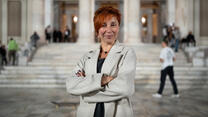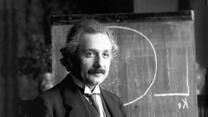From art to policies, traditions to dreams, refugees are shaping the future in ordinary - and extraordinary - ways.
This World Refugee Day, test your knowledge and learn more about the incredible ways refugees shape the world around us. Take the quiz below - some of the answers might surprise you!
Ke Huy Quan, 2023’s best supporting actor Oscar winner for “Everything Everywhere All at Once,” was born in Vietnam in 1971. Seven years later, his parents decided to flee in the middle of the night to escape oppression and hardship after the Vietnam War, as almost two million other Vietnamese also risked their lives to do. Quan then lived in a refugee camp in Hong Kong until the U.S. granted his entire family political asylum. In Los Angeles, California, Quan reunited with his entire family under the Vietnamese refugee resettlement programme.
Hercule Poirot became the world’s most famous detective after Agatha Christie found inspiration for him in her small, seaside town in Devon, England, where many Belgians sought refuge during the First World War. Now, over 100 years old, Belgian refugee Poirot appeared in 33 novels, three plays and 69 short stories.
K’naan, the Somali-born Canadian hip-hop artist, grew up in Mogadishu. When civil war broke out in 1991, he fled with his family first to New York City where he reconnected with his father, and then to a Somali immigrant community in Toronto. As a teenager, K’naan used his music to help him process what he experienced in Mogadishu. His album “The Dusty Foot Philosopher” won the Juno Award for best rap recording in 2006.
Lucien Freud was born in Berlin, to Ernst Freud, the youngest son of the psychoanalyst Sigmund, and Lucie Brasch. His parents moved to England in 1933 when he was 11, fearing Nazi Germany’s persecution of Jewish people. In 1939, Lucien Freud became a British citizen and went on to become one of the finest painters of the 20th century.
André Breton was the co-founder, leader, and principal theorist of surrealism. He was born in 1896 in a small town of Normandy, France. During World War II, the Vichy government banned his writings as “the very negation of the national revolution.” He then escaped with the help of Varian Fry and Hiram Bingham IV to the United States and the Caribbean in 1941. He emigrated to New York City where he went on to organise a groundbreaking surrealist exhibition at Yale University.
You can learn more about André Breton’s journey to the United States by watching “Transatlantic” on Netflix!
Freddie Mercury, the British singer-songwriter who achieved worldwide fame as the lead vocalist of Queen, wasn’t always Freddie Mercury. He was once Farrokh Bulsara. Born in 1946 in Zanzibar to Parsi-Indian parents, his family fled the Zanzibar Revolution in 1964 to find safety in the UK.
Frédéric Chopin was a Polish composer and pianist whose brilliance as a pianist started when he was just a child. As a student, he and his friends planned an insurrection against the Russians. His role was to give voice to Poland’s struggle abroad through his music during the uprising. After leaving Warsaw for Vienna, fighting broke out, and Chopin was notified that he was no longer welcome back in Poland.



